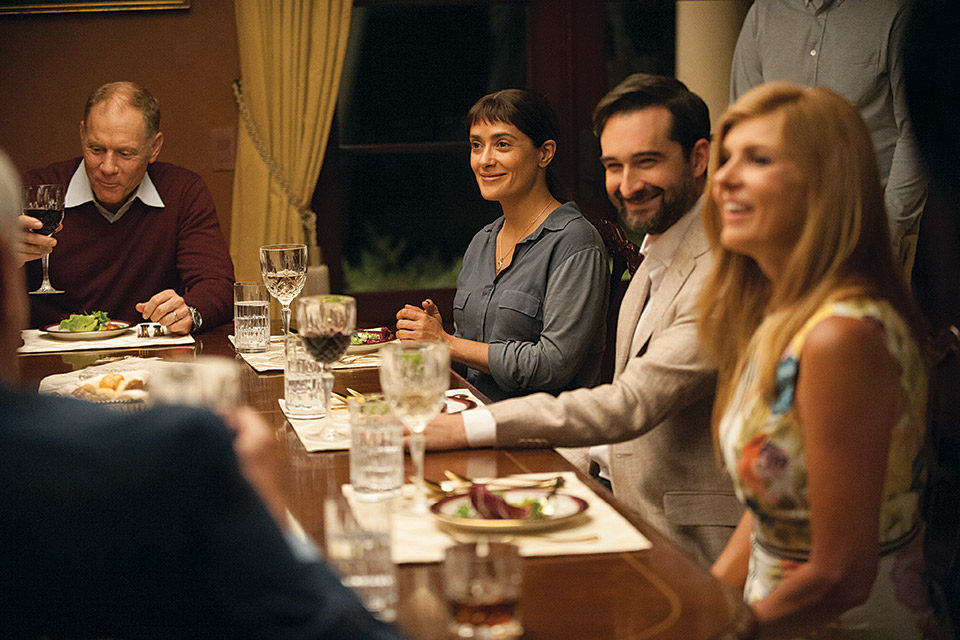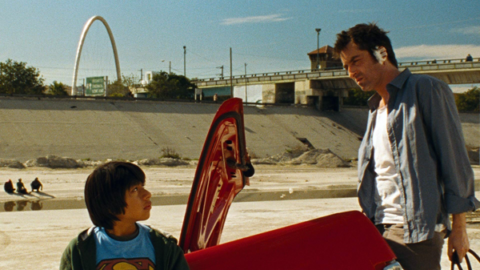By Violet Lucca in the May-June 2017 Issue

Review: Beatriz at Dinner
(Miguel Arteta, USA,
Roadside Attractions, Opens June 9)
Miguel Arteta and Mike White seem unlikely candidates to produce this generation’s Rules of the Game, but, as the Trump administration proves almost every day, anything is possible. In their quietly acerbic new chamber drama, directed by Arteta and written by White, Beatriz (Salma Hayek) is a Mexican immigrant who works in a service industry that doesn’t quite fit the upstairs/downstairs split: spirituality. She divides her professional life between the Arendale Cancer Center, offering alternative therapies for cancer patients, and bodywork house calls for clients and friends like yuppie Cathy (Connie Britton). After Beatriz’s beat-up Volkswagen refuses to start, Cathy tells Beatriz that she can spend the night at her oceanside mansion and deal with it in the morning—an offer that comes with an invitation to the posh dinner party Cathy’s hosting to celebrate a lucrative land development deal co-negotiated by her husband, Grant (David Warshofsky).

From the May-June 2017 Issue
Also in this issue
But there’s little for anyone not directly profiting off this super-sized transaction to toast—the more you know, the more unpalatable it gets. Grant’s two partners are business-bro Alex (Jay Duplass) and Doug Strutt (John Lithgow), a real estate mogul and complete motherfucker who’s loudly proud to be both. Over whiskey, neat, they laugh about the shortcuts they’ve taken and legalities they’ve skirted but not quite broken; Doug’s Mephistophelian refrain/justification is “not everyone’s like me, and thank god!” Their wives (Alex’s first, Doug’s third) exchange polite, knowing banter about their husbands’ laissez-faire approach to business and general dickishness—isn’t it so funny that they’re awful? Let me tell you about the kids.
Meanwhile Beatriz, diminutive and unassuming in her 10-years-out-of-date cargo pants and sneakers, quietly observes the grotesquerie and occasionally interjects a bit of new age-y earnestness that her fellow guests don’t quite know how to process. The requisite loaded questions—“Where are you from? No, where are you really from?”—hint at the guests’ preconceptions about her, though nobody comes out and says, “I wasn’t expecting a brown-skinned Mexican woman with an accent to know anything about Zen, macrobiotics, and Reiki.” Yet the incredulity is clearly bubbling underneath the glossy SoCal liberal surface; Alex for one thinks it’s okay to respond to de nada by shouting ¡ay chihuahua! and saying that he “loves Cancun.”

The “pleasant surprise” about who Beatriz is and what she values dwindles away as the wine flows and she becomes more vocal, asking questions of Doug’s past real estate deals. Her hometown, it turns out, suffered a fate not unlike that of Balmedie, Scotland, at the hands of Trump and his golf boondoggle: a developer promised her neighbors hundreds of jobs and destroyed an environmentally vulnerable area to build a resort, only to have it fail within a year. Things come to a head more than once, and, like an argument in an online comments section, it’s alternately satisfying and excruciating to witness.
Lithgow plays Doug with a relaxed, smug confidence, never chewing scenery—you know, the same kind of vibe our president gives when he hasn’t been riled by something he saw on Fox News. Hayek—a sorely underappreciated actress who seems to get roles worth her mettle only once a decade (at best)—exudes empathy and pathos without being matronly or sanctimonious, and proves an unpredictable foil to Lithgow’s not-Trump Trump.
But more than simply provoking outrage at those among us who delight in making a buck off of not giving a damn, Beatriz at Dinner is profoundly sad. The film offers no answers because it has none: it affirms that we do not live in a world where Doug’s kind can be properly redressed, because they are insulated by money and power. What begins as a cry of anger swells to a sob.




